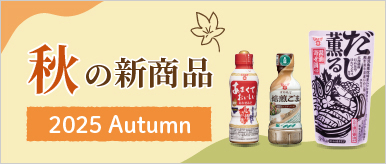
Quality Control / Environmental Conservation
Quality Control

Four Guidelines for High Quality
Visiting Places of Material Production
With our belief that "good products originate from good materials," our staffs in charge of material procurement visit places of material production and communicate with their producers to obtain quality agricultural products.
Organizing and Cleaning in Factories
To produce our products in an excellent environment, we continue to practice 5S activity (Seiri, Seiton, Seiketsu, Seiso and Shitsuke: See below for explanation) at our factories, which allows us to always show them to visitors.
Pursuing Better Taste
We have been pursuing better taste (quality) depending not only on analytical instruments but also on human five senses, while maintaining and further developing our fermentation technology, which we have inherited since our foundation.
Opinions and Complaints from Customers
To further improve the quality of our products, we quickly respond to opinions and complaints from our customers, thoroughly investigate the causes of problems and take measures to remedy them.

Fundokin's Original System of Quality Assurance
In 2001, we established the quality assurance department to equalize the quality of products manufactuerd at our four factories. The main role of the department is to assure our customers of the quality of our food products by inspecting the factories for the safety and reliability of our products.
Main Duty
We check the quality of materials and products by analyzing them with various measuring instruments, including microorganism tests. We also visit the factories of materials which we use for our products and inspect their production environments.
By managing materials, production processes and products in this way, we always make sure that our system of producing and selling safe and quality products functions properly.
Cooperates with Factories
The department, which is highly independent, visits all of "the main factory," "the soy sauce factory," "the miso factory" and "the dressing factory," examines if our products are produced through the proper processes following ISO 9001 and objectively judges, using latest instruments, if the finished products meet the required standards.
Factory Management System
5S Activity Based on ISO 9001
Since 2003, each Fundokin factory obtained ISO 9001 certification. In the process of obtaining the certification, we set up 5S activity (Seiri: Sorting out necessary things, Seiton: Setting things in order for efficiency, Seiso: Cleaning, Seiketsu: Maintaining cleanness, Shituske: Discipline or making rules customary). Our factory workers are always conscious of improving the production processes in the factories to improve our product quality and production efficiency.
HACCP and an Organic JAS Certified Factory
Responding to the recent rise of the consciousness of food safety among consumers, we have introduced in our factory designing the concept of HACCP (a hygienic management system to control and record the critical points in all the processes of food material procurement, production and shipping to prevent food hazards) and actively taken measures for preventing food hazards, such as the prevention of contamination. In addition, our miso factory has obtained the "Organic JAS Certification." There, our There we produce safe and quality miso for customers, following minute and strict standards for factory facilities, raw materials, production and processing methods and shipping.
Product Record Is Checked Within 30 Minutes after Inquiry: Miso Factory
To secure our food product safety, we obtained ISO 9001 (2008), the international standard for the quality management system, in July 2003. Since then, we have renewed the certification in 12 consecutive years. It has helped us to establish an integrated product traceability system (a system of tracing all product information) which keeps track of all information of all our products throughout material crop cultivation, processing, production and shipping. The system has allowed us to trace all information of any product within 30 minutes after inquiry.
We also require ourselves to visit the places of material production, including north America and China, at the time of harvest every year and to inspect the produced materials on-site.
From the viewpoint of "food quality and safety," the vulnerability of miso production is contamination with foreign objects. Once foreign objects enter miso, they cannot be removed. While foreign objects can be removed from liquid through filtration, it is very difficult to remove them from miso, which is semisolid or paste. To prevent such contamination, we repeat the examination and sorting of materials and use only those which have passed the sorting process. We also take all possible measures to prevent contamination in the whole production process, including conveyers and mixers.





















